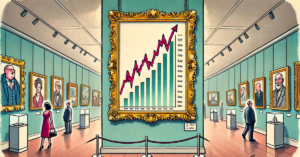Article

The United Kingdom is poised for a significant political shift as the announcement of a general election has stirred the nation. The current political climate and polling data suggest that a Labour victory is highly likely, bringing excitement and uncertainty. This potential shift in government could have substantial implications for investors, particularly for traditional investments. In this blog post, we will explore the possible impacts of a Labour win on traditional investments and how investors can protect their portfolios by turning to alternative investments.
The Political Landscape: A Labour Win on the Horizon
Recent polls indicate a growing likelihood of the Labour Party securing a victory in the upcoming general election. This potential shift comes after years of Conservative governance, and the prospect of a new administration has many speculating on the changes it will bring. Labour’s platform, typically more progressive and socially oriented, promises increased public spending, higher taxes on the wealthy, and significant regulatory reforms.
While these policies aim to address social inequality and boost public services, they also raise questions about their impact on the economy and, consequently, on investments.
Impact on Traditional Investments
Stock Market Volatility
A Labour win is expected to introduce a period of heightened volatility in the stock market. Historically, markets have shown apprehension towards Labour’s policies, particularly those involving increased corporate taxes and tighter regulations. Sectors such as finance and energy may experience significant fluctuations as investors react to the new policy directions.
Increased Taxes
Labour’s commitment to redistributing wealth through higher taxes on corporations and high-income individuals could affect corporate profits and, subsequently, shareholder returns. This might lead to a reduction in dividends and a dip in stock prices for companies facing higher tax burdens.
Regulatory Changes
Labour’s agenda includes stricter regulations in various sectors, including finance, housing, and utilities. While these measures aim to protect consumers and ensure fair practices, they could also lead to increased operational costs for businesses, affecting their profitability and investment appeal.
Public Spending and Inflation
Increased public spending, another cornerstone of Labour’s policy, could drive inflation higher. While this might stimulate economic growth in the short term, sustained high inflation can erode the value of fixed-income investments, such as bonds, and reduce real returns for investors.

Protecting Your Portfolio with Alternative Investments
Given the potential challenges facing traditional investments, investors may consider diversifying their portfolios with alternative investments. These assets often exhibit lower correlations with traditional markets and can provide a hedge against political and economic uncertainties.
Gold
Gold has long been considered a safe-haven asset, providing a hedge against inflation and currency fluctuations. In times of economic and political uncertainty, gold tends to retain its value and can offer stability to an investment portfolio. Its liquidity and global acceptance make it a reliable option for investors seeking to protect their wealth.
Property
Investments in property can provide stability and income through rental yields. Real estate tends to appreciate over time and can offer a buffer against inflation. Additionally, property investments are less susceptible to the volatility of the stock market, making them an attractive option during periods of economic uncertainty.
Private Equity and Venture Capital
Private equity and venture capital investments allow investors to gain exposure to high-growth companies not listed on public markets. These investments can offer substantial returns and are less affected by public market volatility. However, they require a longer investment horizon and a higher risk tolerance.
Art Investment
Art investment has emerged as an alternative asset class that can offer significant returns. Unlike traditional financial markets, the art market is driven by different dynamics, including cultural trends and the rarity of artworks. Investing in art requires expertise and can involve high transaction costs, but it also provides diversification and potential for substantial appreciation in value over time.
Cryptocurrencies
While highly volatile, cryptocurrencies like Bitcoin and Ethereum have gained popularity as alternative assets. They offer the potential for significant returns and can act as a hedge against traditional market downturns. However, investors should be aware of the risks and regulatory uncertainties associated with this asset class.
As the UK braces for a general election, the potential for a Labour victory brings both opportunities and challenges for investors. Traditional investments may face headwinds from increased taxes, regulatory changes, and market volatility. To navigate this uncertain landscape, diversifying portfolios with alternative investments can provide a buffer against political and economic shifts, helping to safeguard returns and manage risk.
At De Pointe Research, we are committed to providing our clients with insights and strategies to navigate the evolving investment landscape. Subscribe to the De Pointe Research Blog to keep one step ahead of the ever-changing investment landscape.






